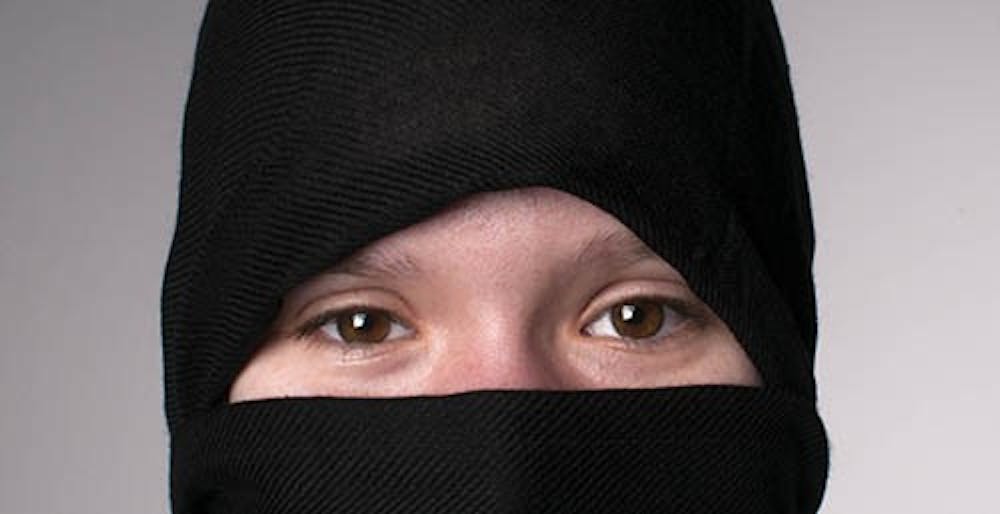At age 15, Soha Fallata put on the hijab, a form of loose, robe-like dress and veil that wrapped around her face and concealed all but her eyes.
It was a choice the graduate student would make twice in her life, when in 2009 she left her home country of Saudi Arabia and came to the United States to pursue a Ph.D. in education studies at Ball State.
“There’s not as much pressure here as there is in Saudi Arabia to wear the hijab,” Fallata said. “But I made the decision that I wanted to stay true to my faith ... It’s an opportunity to show what Islam is really about, to clear the misconceptions left from 9/11”
In Saudi Arabia there are ethical police, known as the mutawa, who enforce religious dress codes and Islamic observances. Five years ago, it became acceptable for women to wear a form of hijab that only covers around the wearer’s face, the type of hijab Fallata wears today.
STEREOTYPES
One misconception Fallata sees is that all Muslim women who wear the hijab are oppressed, due to the media’s portrayal of women in Islam.
“The main stereotype is that they think the hijab confines you, that it doesn’t let you express yourself or that it deprives you of having fun,” Fallata said. “But that’s completely not true. We are stylish, we can wear make-up or wear the latest trends and have fun.”
Fallata goes swimming with her friends, enjoys shopping and frequents the movie theaters like the typical student. She keeps up on shows such as “Downtown Abby” and “Grey’s Anatomy.”
She said because she wears the hijab, she gets an occasional shout from a passerby. But it’s nothing more than the Islamic greeting, “Peace be upon you,” from a passing cyclist. Fallata has never felt hassled because of her practices.
Assistant professor in the Department in Anthropology Jennifer Erickson said the western culture judges other cultures when it comes to women’s rights, but there are many discrepancies in America.
“In the U.S. there’s this judgment,” Erickson said. “We see other cultures and say, ‘Look at how well we treat our women.’ But we have our own problems.”
Erickson has traveled to Bosnia and Herzegovina and southern Sudan in her studies. She said in most countries women have a long way to go with reproductive rights, politics, economics and education.
One example in the U.S. is the number of women in Congress in Rwanda compared to the U.S. In 2012, women made up less than 17 percent of Congress, according to Business Insider. America ranks 83rd among 189 nations in the amount of elected female officials in government.
“I don’t think there is a correlation between women’s power and how developed a country is. ... You can’t say women in western cultures are treated so much better than in developing nations. If we look at violence against women, we are not faring well,” Erickson said.
TRANSITIONS
When Fallata moved to the United States, she had an idea that people might talk.
Fallata said studying in a mixed-gender classroom also isn’t a common practice back home. When she is in a meeting where she is the only female, she knows that it would be looked down on in her hometown, where the mutawa enforce strict gender segregation laws. Fallata said if a man and a woman sit across from each other in a restaurant, the mutawa can drag them out and into the police station to be interrogated.
"My family is open-minded, they trust my values. I’m trying to do things to stay true to myself and what I believe,” Fallata said.
EMPOWERMENT AND RIGHTS
For Fallata, the hijab is not about oppression but empowerment, it is not just a veil or a robe. It’s a way of behaving in a way to “Keep the image of a woman who demands respect.”
In her hometown, the hijab actually protects her from harassment from males giving unwanted attention; something that Fallata said is a larger problem in Saudi Arabia than it is in the states.
“[By wearing the hijab] you are doing your part,” Fallata said. “It is not socially acceptable for men to feel it’s OK to say inappropriate things to a woman, regardless if she wears the veil or not or how she dresses. But, you cannot control everyone.”
It’s a two-way street. Fallata said in Islam women are asked to wear the hijab and men are asked to lower their gaze and be respectful in a women’s presence. Fallata said she thinks harassment is a problem in Saudi Arabia because there is no law against men practicing that behavior.
“Women have not reached the stage where they have all their rights, but they are getting there and I don’t think women have gotten their rights fully even in non-Islamic developed countries. The difference in [wages] is a simple example,” Fallata said.
Fallata said women in Saudi Arabia may not have all of their rights because of many reasons, but Islam isn’t one of them.
“No one should be judged, and that discussion of judging isn’t getting into the real issues. It’s not just about what they are wearing, it’s what they’re wearing and what that says about their culture,” Erickson said.


